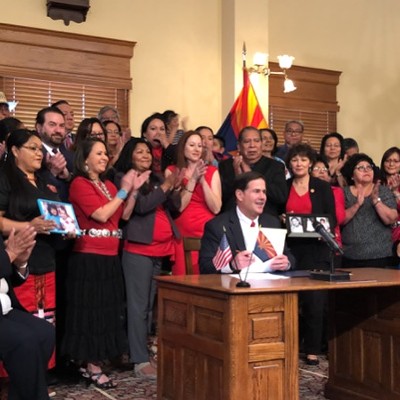Well, about midway through, the Arizona Senate voted to eliminate the state's Department of Environmental Quality.
"They've talked about it before, but they've never actually done it," says Bahr. "The fact that they voted down the bill to keep DEQ around was pretty outrageous."
Senators were responding to complaints from business lobbyists that DEQ, led by Director Steve Owens, was concentrating too much on enforcement of Arizona's environmental laws.
In the end, DEQ was given two years to shape up its act, rather than the 10 years it typically gets. But DEQ was probably never in much danger of outright elimination; without the state agency to serve as a buffer, businesses would have to deal with the federal Environmental Protection Agency. As Bahr points out, the federal agency probably wouldn't have been tougher when it came to handing out permits, but it surely would have been slower.
"Maybe that's how we get growth management in this state," Bahr joked. "We get rid of DEQ and have EPA do all the permitting."
The DEQ skirmish illustrates the hostility that many lawmakers, particularly in the Republican caucus, feel toward environmental protection, says Bahr, who last week released the Sierra Club's annual report card on environmental issues. Of the 90 legislators at the Capitol, 54 failed outright--a new record--and 24 earned A's. Gov. Janet Napolitano picked up a C grade, primarily because she signed two bills opposed by the Sierra Club after initially vetoing them.
The grades were based on key votes on a number of bills. Among them:
· A forest health bill that provided timber companies various tax breaks for clearing forests. Bahr complains the bill lacked protection for old-growth trees, but Napolitano signed a second version after vetoing the initial bill.
"The forest bill had relatively few changes, and certainly from an environmental perspective, there was nothing that had changed," Bahr says.
· An "animal and environmental terrorism" bill that creates a new class of terrorism crimes based on vandalism related to political activism. The bill was vetoed by Napolitano twice--once last year and once during this session--and then resurrected with changes the governor found acceptable.
"The Sierra Club isn't engaged in any unlawful activities, so it's not like we're concerned about this bill being applied to us," Bahr says. "But we are concerned about it being one of many efforts to try to have a chilling effect on people's activism."
Bahr says the impetus for the bill came not from Arizona prosecutors who were concerned about an outbreak of environmental terrorism, but from the American Legislative Exchange Council, a rightward-leaning outfit that is pushing states around the country to adopt similar statutes.
"From day one, it was a political ploy to stigmatize environmental and animal activists," says Bahr. "It seems like a bad idea for the governor to play into that."
· A bill that would have gutted the city of Tucson's ability to enforce billboard violations against Clear Channel Outdoor. The bill passed the Legislature but was vetoed by Napolitano.
· A bill that would have allowed billboards with flashing messages along Arizona's highways. The bill passed the Legislature but was vetoed by Napolitano.
· A bill that set higher standards for air quality in classrooms. The bill passed the Legislature and was signed into law.
· A bill that raided the Heritage Fund, a lottery-supported fund designed to support efforts to protect wildlife and habitat, to settle a longstanding dispute with the Zuni Indian tribe over water rights. The bill passed the Legislature but was vetoed by Napolitano.
Among Southern Arizona lawmakers, Sen. Gabrielle Giffords, a Democrat who represents central Tucson, earned a Most Valuable Player award.
"She's been a strong supporter on environmental issues and goes above and beyond to try to get amendments on bills," Bahr says. "She speaks out on issues that maybe aren't so popular with legislators, like protection of endangered species. She does a good job. She just needs some more company."
Other local lawmakers who earned A's: Sen. Jorge Garcia (D-27), Sen. Vic Soltero (D-29), Rep. Phil Lopes (D-27), Rep. Carmen Cajero Bedford (D-27); Rep. Dave Bradley (D-28), Rep. Ted Downing (D-28), Rep. Linda Lopez (D-29) and Rep. Tom Prezelski (D-29).
The B: Rep. Pete Hershberger (R-26).
The D's: Sen. Toni Hellon (R-26), Rep. Steve Huffman (R-26) and Rep. Marian McClure (R-30)
Flunked!: Sen. Marsha Arzberger (D-25), Sen. Tim Bee (R-30), Rep. Jennifer Burns (R-25) and Rep. Jonathan Paton (R-30).
The best environmental news of the session, according to Bahr: The Senate confirmed Robert Hernbrode's appointment by Napolitano to the Arizona Game and Fish Commission to take the place of rancher Sue Chilton.
"He replaces one of the worst Game and Fish commissioners we have seen, and he has actual knowledge and background on wildlife management issues," Bahr says. "Somewhere in Arizona, a prairie dog has sighed in relief."

















